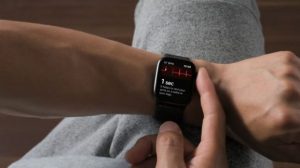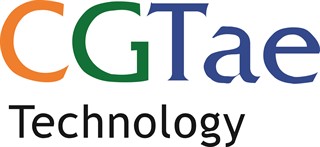
The new Apple Watch Series 4 shows nutritional information at a glance. A watchface — Breathe — guides you through one of three breathing exercises. And thanks to next-gen accelerometer and gyroscope units that measure forces up to 32 g-forces, it can automatically detect when you fall.
“One of the most common injuries is falls,” said Apple chief operating officer Jeff Williams.
The Apple Watch Series 4 delivers an alert when it detects you’ve made contact with the ground, and surfaces a one-tap notification that can place a call to emergency services. If you’re immobile for more than one minute, it automatically calls 911 and sends a message containing your location to loved ones via Apple’s SOS feature.
The Apple Watch Series 4 also has three new heart monitoring features.
One sends a notification if your heart rate is determined to be too low. The second screens for heart rhythm irregularities that appear to be atrial fibrillation (AFib), which is caused by poor blood flow and can increase the risk of cardiovascular conditions such as stroke and heart attack. (With watchOS 5, it intermittently analyzes heart rhythms in the background.) And the third allows you to record electrocardiograms (ECGs) with the Watch’s crown and sapphire glass back.
Recordings take less than 30 seconds and are saved in PDF format for easy exporting. Apple claims the Apple Watch Series 4 is the first ECG product offered over the counter directly to consumers and the first of its kind to receive clearance (De Novo classification) from the U.S. Food and Drug Administration. (It’s worth noting that AliveCor’s EKG-reading KardiaBand was cleared by the FDA in 2017.)
It’s not without caveats. ECGs aren’t meant to be taken by people younger than 22 or those who have known heart conditions, the FDA noted in a summary document, and it warns that the Apple Watch Series 4 “is not intended to provide a notification on every episode of irregular rhythm suggestive of AFib and the absence of a notification is not intended to indicate no disease process is present.”
Still, FDA chief Scott Gottlieb expressed enthusiasm about the new feature.
“The FDA worked closely with the company as they developed and tested these software products, which may help millions of users identify health concerns more quickly,” he said in a statement.
The Apple Watch Series 4 retains a photoplethysmography (PPG) sensor, which estimates beats per minute (BPM) by measuring the rate at which green light is absorbed by the blood flowing through your wrist. But ECGs are considered to be more accurate.
As ever, health data collected by the Apple Watch is encrypted on-device and in the cloud. AFib detection and ECG will be available later this year in the U.S., and roll out to other regions in the coming months.
Today’s announcements follow on the heels of Apple Watch-related health news in June, at Apple’s 2018 Worldwide Developers Conference. The Cupertino company demoed new workout types, improved activity tracking, and automatic workout detection in watchOS 5.
One thing that wasn’t announced today: a new in-house chip for biometrics. In August, CNBC uncovered job postings from Apple’s Health Sensing hardware team that hinted at a processor for health data management. If today’s event is any indication, the chip — if there is such a chip — won’t make it into this year’s Apple Watch.
HealthKit, at its core, is a repository for health data — metrics like weight, steps, blood pressure, and heart rate. One of Apple’s earliest HealthKit partners was Nike, which worked to integrate its health and fitness apps with the platform.
In November 2017, Apple partnered with Stanford on a study that sought to predict defect AFib in patients using the Apple Watch’s heart rate sensor. The study invited wearers who may have an irregular heart rate to attend a free medical consultation and be fitted with an ECG patch for continued monitoring.
“Through the Apple Heart Study, Stanford Medicine faculty will explore how technology like Apple Watch’s heart rate sensor can help usher in a new era of proactive health care central to our Precision Health approach,” Lloyd Minor, dean of Stanford University School of Medicine, said at the time.
iOS 11.3 brought with it an electronic health record initiative (via an updated Health app) that attempts to unify medical data from multiple hospitals, clinics, and providers in one place. (Those on board included Johns Hopkins Medicine, Cedars-Sinai, Penn Medicine, and more than 70 other institutions.) The new and improved Health app shows notifications when data about allergies, conditions, immunizations, lab results, medications, procedures, and vitals are updated, and adheres to FHIR (Fast Healthcare Interoperability Resources), a standard for transferring electronic medical records.
